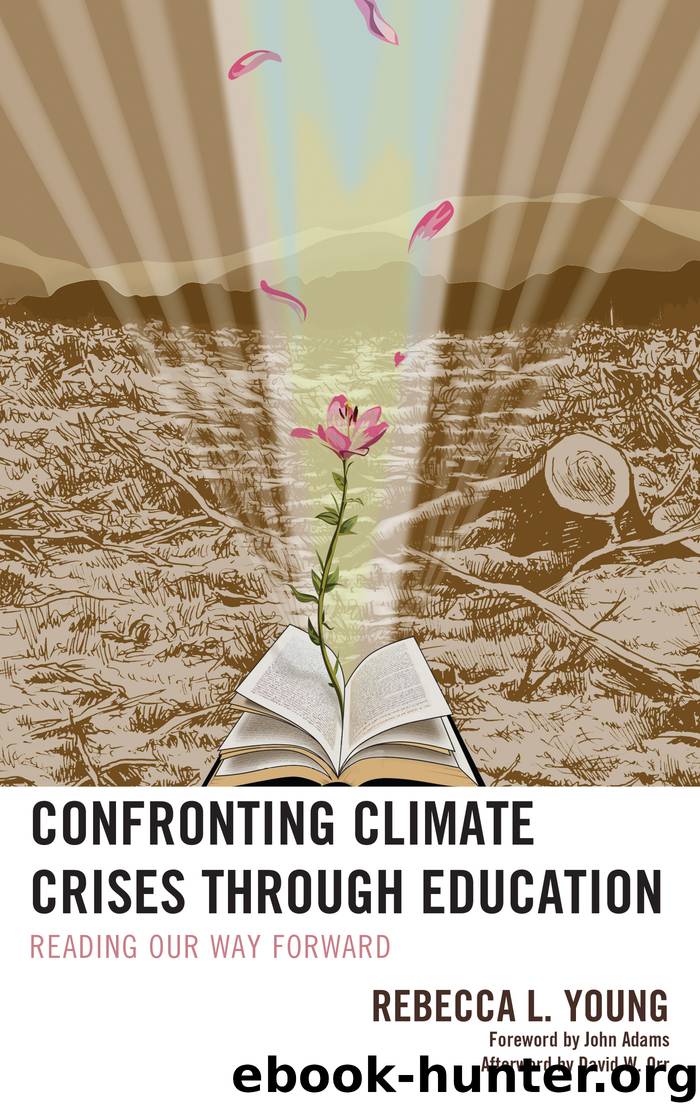Confronting Climate Crises Through Education by Young Rebecca L.;Adams John;Orr David W.;

Author:Young, Rebecca L.;Adams, John;Orr, David W.;
Language: eng
Format: epub
Tags: undefined
Publisher: Lexington Books/Fortress Academic
Published: 2012-08-15T00:00:00+00:00
As we saw in Quinnâs novel, Berry scolds us for having squandered Leaver ideologies for Earth-abusing practices that serve our needs more cheaply and quickly. The cost of these practices, of course, manifests itself in more complex ways. It is evidenced, according to Berry, in a failing education system, hypocrisies in politics, the breakdown of American families, corruptions of free markets, eradication of farm land, an epidemic of preventable illnesses, disintegration of natural resources, and perhaps most blatantly, dismissal of individual responsibility.
If students have difficulty connecting the machine metaphor to these broad implications, educators might focus them on the more intimate effects they can recognizeâfrom the absence of family dinners at the table to not knowing even our closest neighborsâ names. As Berry references, this ethos of mechanization pervades every aspect of our livesâfrom birth to death. Just as life-sustaining food is a common ground for bringing awareness to complex topics, so is death. Especially for students who may not be able to see the more complex or abstract effects of the current ethos, literature can illustrate them in more concrete terms.
A personal essay in the Moral Ground collection offers, for example, an accessible lesson for explicating Berryâs intimation that we disrupt even the ânatural cycles of birth, growth, death, and decay.â Carly Letteroâs âSpray Glue Goes. Maggots Stay.â focuses on how an anthropocentric worldview of âprogressâ follows us even in our deaths, separating us superficially from nature and its processes. The narrative achieves this by juxtaposing the ways humans treat a body after death with how nature does. Upon witnessing the hospitalâs procedural sanitizing of her grandfatherâs dead body, which includes âso much disposable crapâ in the form of âhermetically sealed cotton swabs,â ârubber gloves,â âindividually wrapped wipes and plastic padded sheets,â[9] Lettero recalls a very different memory of finding the body of a sea lion that had washed ashore on a coast of Oregon:
Turkey vultures pecked into its stomach and chest, and black fluid flooded the holes. Closer still the holes were crawling with bugs. Maggots slithered through the black liquid and burrowed into the soft tissue. Flies swarmed above the body, landed, got swept down the beach by a gust of wind, and swarmed again. So much life spiraled out from this one dead animal. In stark contrast to my grandfatherâs death, nothing was wasted.[10]
Download
This site does not store any files on its server. We only index and link to content provided by other sites. Please contact the content providers to delete copyright contents if any and email us, we'll remove relevant links or contents immediately.
The Power of Myth by Joseph Campbell & Bill Moyers(1047)
Half Moon Bay by Jonathan Kellerman & Jesse Kellerman(977)
Inseparable by Emma Donoghue(973)
A Social History of the Media by Peter Burke & Peter Burke(968)
The Nets of Modernism: Henry James, Virginia Woolf, James Joyce, and Sigmund Freud by Maud Ellmann(890)
The Spike by Mark Humphries;(805)
The Complete Correspondence 1928-1940 by Theodor W. Adorno & Walter Benjamin(773)
A Theory of Narrative Drawing by Simon Grennan(773)
Culture by Terry Eagleton(770)
Ideology by Eagleton Terry;(729)
World Philology by(711)
Farnsworth's Classical English Rhetoric by Ward Farnsworth(710)
Bodies from the Library 3 by Tony Medawar(705)
Game of Thrones and Philosophy by William Irwin(702)
High Albania by M. Edith Durham(697)
Adam Smith by Jonathan Conlin(685)
A Reader’s Companion to J. D. Salinger’s The Catcher in the Rye by Peter Beidler(674)
Comic Genius: Portraits of Funny People by(647)
Monkey King by Wu Cheng'en(643)
